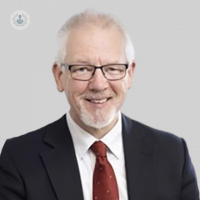Rotator cuff injuries and how they are treated
Written by:The rotator cuff refers to a group of muscles and tendons surrounding the shoulder joint, which keep your upper arm bone in the socket of the shoulder. An injury to the rotator cuff often causes an ache in the arm, which can get worse with stretching, such as when sleeping on the injured side, or when reaching out to pick up an object. Mr Simon Lambert, specialist in shoulder and elbow surgery, talks to Top Doctors about rotator cuff injuries.

Rotator cuff injury – causes
The rotator cuff often wears out over time: most people over the age of 60 have some degeneration of the tendons of the cuff. Injury, through overhead exertion or over-reaching, is therefore more common as we get older. However the tendons can be damaged by repetitive, or excessive, over-loading at any age.
Rotator cuff pain and symptoms of injury
If you have a rotator cuff injury you may experience an aching pain in the side of the upper arm which continues throughout the day, and makes certain activities difficult and painful, such as reaching behind your back, or brushing your hair. You may also feel that your arm is weaker than usual. Commonly your sleep may be disturbed by a similar pain, which has a burning quality. It is not easy to make a diagnosis of a rotator cuff tear simply by considering the symptoms: if your pain lasts longer than a couple of weeks even with simple painkillers and rest, you should see a shoulder specialist (physiotherapist or doctor). They will suggest investigations and consider a management plan with you to reduce the chance of progression of the rotator cuff problem.
Rotator cuff surgery and treatments
Most problems with the rotator cuff can be treated without surgery, but ideally they should be treated as soon as possible after the onset of symptoms. Treatment such as medication, guided injections, and physical therapy are the mainstay of management. In some cases symptoms do not improve, and the doctor or specialist may send you for tests such as an MRI or ultrasound scan to see if a rotator cuff tear is present, and if so where and how big it is.
Surgery can often be useful to help recover from a rotator cuff tear. Surgery can be useful in providing pain relief, strength, and so better function at any age. Surgery is generally advised for those who have a rotator cuff tear caused by sudden injury, or when non-operative treatment has been tried for at least 3 months without success.
The outcomes of surgery are slightly more favourable in younger people, whose tendons are more elastic and healthy. As the rotator cuff gets older it becomes stiffer and the tendons are not so healthy, and so the outcomes for surgery to get the tendon tear to heal are not quite so good. However much can be done to gain pain relief, even if the tendon does not eventually heal.
The recovery from surgery takes time, whether the operation is done with key-hole (arthroscopic) or open surgery: the tendon heals in the same way and over the same time whichever technique is used. A period of up to three months graded rehabilitation is needed before the tendon tear heals sufficiently for normal activities to resume, although this varies depending on the size and position of the original tear.


